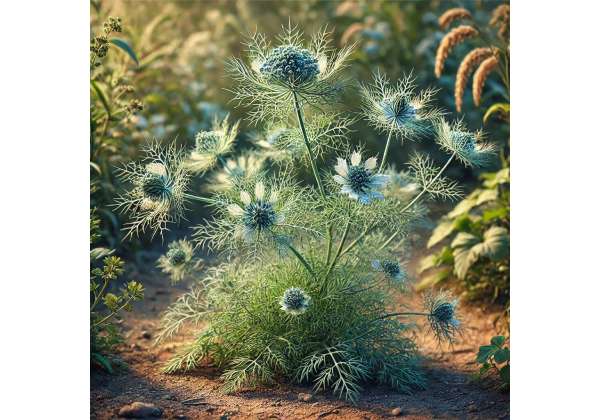Black cumin, botanically known as Nigella sativa, has been treasured for centuries for its unique flavor, aroma, and wide-ranging health benefits. Often referred to as the “seed of blessing,” this remarkable herb has played a pivotal role in traditional culinary and medicinal practices across the Middle East, South Asia, and beyond. Its tiny black seeds pack a powerful punch of bioactive compounds that modern science is beginning to validate, from potent antioxidants to anti-inflammatory agents. Whether you’re adding a dash to your favorite dish or taking it as a supplement for wellness support, black cumin stands out as a natural ally for maintaining balance and vitality.
Before we dive into the detailed exploration of black cumin, here are some of the most significant benefits this versatile herb offers:
- Supports immune system health
- Helps reduce inflammation
- Promotes healthy digestion
- Provides antioxidant protection
- Supports respiratory and cardiovascular wellness
- Aids in balancing blood sugar levels
- Contributes to overall well-being
Table of Contents
- Black Cumin Botanical Profile: Identification and Characteristics
- Black Cumin Historical Perspective: Traditions and Cultural Significance
- Black Cumin Phytochemical Profile: Active Components and Nutrient Composition
- Black Cumin Health Benefits: Support for Immunity, Digestion, and More
- Black Cumin Properties: Key Features and Natural Potentials
- Black Cumin Uses and Safety: Culinary, Supplementation, and Precautions
- Black Cumin Scientific Studies: Research, Evidence, and Insights
- Black Cumin FAQs: Common Questions Answered
Black Cumin Botanical Profile: Identification and Characteristics
Black cumin is an annual flowering plant native to South and Southwest Asia, now cultivated in various regions around the globe. The plant grows to a modest height, producing delicate, pale blue or white flowers that eventually give way to the tiny, matte black seeds recognized for their distinctive, slightly bitter and peppery flavor.
Recognizing Black Cumin
When you first encounter black cumin, its small, angular seeds might catch your eye. Despite their modest size, these seeds are densely packed with essential oils and active compounds. The plant itself features finely divided, feathery leaves and an erect stem that supports clusters of tubular flowers. Typically, the seeds are harvested when the seed pods dry and the seeds are fully matured, ensuring the highest concentration of their beneficial properties.
Growing Conditions and Cultivation
Black cumin thrives in warm, sunny climates with well-drained soil. It’s particularly well-suited to arid and semi-arid regions where its drought-resistant nature allows it to flourish despite limited water availability. Farmers and gardeners alike appreciate black cumin for its low-maintenance growth requirements and its ability to adapt to various environmental conditions. Organic cultivation practices are common, as preserving the natural integrity of its bioactive compounds is a top priority.
Identification Tips in Nature
For those interested in foraging or growing black cumin, here are some handy tips:
- Seeds: Look for small, matte black seeds with a slightly angular shape. Their texture is rough, and they have a distinctive aroma when crushed.
- Flowers: In season, the plant produces tubular flowers that are usually pale blue or white.
- Leaves and Stem: The plant’s leaves are finely divided, giving it a feathery appearance, and the stems are upright, supporting clusters of flowers.
- Habitat: Black cumin is often found in fields and gardens in regions with warm, dry climates.
These botanical characteristics not only make black cumin easily identifiable but also hint at the robust nature of its active components.
Black Cumin Historical Perspective: Traditions and Cultural Significance
The story of black cumin is as rich and varied as the regions where it has been used for millennia. Revered in traditional medicine and culinary arts, black cumin has woven itself into the fabric of many cultures, carrying with it a legacy of healing and nourishment.
Ancient Traditions and Folklore
Black cumin’s history can be traced back to ancient civilizations in Egypt, Greece, and India. Historical records reveal that it was used not only as a spice but also as a medicine to treat various ailments. In ancient Egypt, for example, black cumin was highly valued and was even found in the tombs of pharaohs as a substance for both spiritual and physical well-being. Similarly, traditional Ayurvedic texts from India mention black cumin as a remedy for digestive and respiratory issues.
Cultural and Religious Importance
The herb’s significance extends beyond its medicinal uses. In Islamic tradition, black cumin is often referred to as a “seed of blessing” and is mentioned in sacred texts as a remedy that can cure every disease except death. This reverence has helped sustain its popularity over the centuries, as the seeds are used in both culinary and ritualistic contexts. In many Middle Eastern and South Asian households, black cumin is a staple in spice blends, cherished for both its flavor and its purported health benefits.
The Journey to Modern Medicine
As cultures evolved, so did the applications of black cumin. Early European herbalists embraced the spice for its digestive and anti-inflammatory properties, and it soon became a common ingredient in traditional remedies. Today, while modern pharmaceuticals have taken center stage in many treatments, black cumin continues to be a popular natural alternative for supporting overall health. Its historical journey—from ancient healing practices to modern-day scientific investigation—highlights its enduring appeal and versatile nature.
Rediscovery in Contemporary Times
Modern consumers are increasingly turning back to natural remedies, and black cumin has enjoyed a renaissance as a result. With its well-documented historical use and growing body of scientific research, this ancient herb has earned a place in the wellness routines of people around the world. Whether it’s incorporated into dietary supplements, herbal teas, or culinary dishes, the legacy of black cumin continues to thrive in today’s health-conscious society.
Black Cumin Phytochemical Profile: Active Components and Nutrient Composition
At the heart of black cumin’s numerous health benefits lies its complex phytochemical makeup. Researchers have identified a host of bioactive compounds in black cumin seeds that contribute to its powerful therapeutic effects.
Key Active Compounds
One of the standout compounds in black cumin is thymoquinone, which is largely credited for many of the herb’s medicinal properties. Thymoquinone is known for its antioxidant, anti-inflammatory, and anticancer properties. Alongside thymoquinone, other important compounds include:
- Nigellone: Known for its potential immunomodulatory effects.
- Alpha-hederin: A saponin that may contribute to the herb’s antimicrobial activity.
- Carvacrol: An essential oil component that has been studied for its antimicrobial and anti-inflammatory properties.
These compounds work synergistically, meaning the benefits of black cumin are greater when the whole seed is used rather than isolated components.
Nutrient Composition
In addition to its bioactive compounds, black cumin is a modest source of essential nutrients. It contains:
- Proteins and Amino Acids: Offering building blocks essential for cell repair and growth.
- Healthy Fats: Including omega fatty acids that support cardiovascular health.
- Minerals: Such as calcium, iron, and zinc, which are vital for various bodily functions.
- Vitamins: Notably vitamin E and some B vitamins that help maintain overall energy levels and support metabolic processes.
The Synergistic Effect
What makes black cumin particularly potent is the way its diverse compounds interact. The synergy between thymoquinone, nigellone, and other constituents helps to enhance their individual effects, resulting in a more robust overall benefit. This natural synergy is one reason why traditional herbal practices have long favored whole-plant remedies over isolated extracts.
Modern Analytical Techniques
Advanced analytical methods such as high-performance liquid chromatography (HPLC) and gas chromatography-mass spectrometry (GC-MS) have allowed scientists to accurately profile the chemical composition of black cumin. These techniques have confirmed the presence of a wide range of phytochemicals and have provided a scientific basis for many of its traditional uses. Such research not only validates historical claims but also opens the door for new therapeutic applications in modern medicine.
Black Cumin Health Benefits: Support for Immunity, Digestion, and More
Black cumin has garnered significant attention for its impressive array of health benefits. Whether you’re looking to bolster your immune system, ease inflammation, or support digestive health, black cumin offers a natural approach to wellness that has been appreciated for centuries.
Immune System Support
One of the most celebrated benefits of black cumin is its ability to support a healthy immune system. The potent antioxidants found in the seeds help neutralize harmful free radicals, thereby protecting the body from oxidative stress. Additionally, nigellone and other compounds have been shown to modulate immune responses, potentially enhancing the body’s natural defenses against infections.
Anti-Inflammatory and Antioxidant Effects
Chronic inflammation is at the root of many modern health issues, from joint pain to cardiovascular disease. Black cumin’s bioactive compounds, particularly thymoquinone, offer strong anti-inflammatory benefits. These properties can help reduce swelling and discomfort, making black cumin a valuable ally for those dealing with conditions like arthritis or other inflammatory disorders. Its antioxidant capacity further aids in protecting cells from damage, contributing to overall health and longevity.
Digestive Health and Gut Function
Traditional medicine has long recommended black cumin for digestive ailments. The herb is believed to stimulate the production of digestive enzymes, which can help improve nutrient absorption and alleviate issues like bloating and indigestion. Its mild antimicrobial properties may also contribute to a healthier gut flora, supporting overall gastrointestinal function.
Cardiovascular and Metabolic Wellness
Emerging research suggests that black cumin may play a role in supporting heart health by helping to regulate blood pressure and cholesterol levels. Some studies have indicated that regular consumption of black cumin can improve lipid profiles and support overall cardiovascular function. Additionally, its potential to aid in blood sugar regulation makes it a promising natural adjunct for metabolic health.
Respiratory Support
Black cumin has traditionally been used to ease respiratory issues, such as asthma and bronchitis. Its anti-inflammatory and antimicrobial properties can help reduce the severity of respiratory symptoms, making it easier to breathe. Whether used as an oil in aromatherapy or taken in supplement form, black cumin may offer relief for those dealing with respiratory challenges.
Overall Energy and Vitality
By supporting various bodily systems—from immune function to digestion and beyond—black cumin contributes to a general sense of well-being and vitality. Many users report feeling more energetic and balanced after incorporating black cumin into their daily routine, which may be attributed to its comprehensive nutritional and bioactive profile.
Black Cumin Properties: Key Features and Natural Potentials
Black cumin is renowned not only for its health benefits but also for its unique physical and chemical properties. These characteristics play a crucial role in how the herb can be used in various applications, from culinary endeavors to therapeutic formulations.
Sensory and Olfactory Qualities
When you crush black cumin seeds, a warm, slightly bitter aroma fills the air—a scent that is both comforting and invigorating. This distinct aroma is due to the presence of essential oils such as carvacrol and thymoquinone. The flavor is equally distinctive, with a complex blend of bitterness, nuttiness, and subtle peppery notes that can enhance a variety of dishes.
Physical Characteristics
The seeds of black cumin are small, angular, and matte black in appearance. Their rough texture is indicative of the dense concentration of bioactive compounds within. Despite their size, these seeds are incredibly potent, and only a small amount is needed to impart both flavor and health benefits. Their durability and long shelf-life make them a popular choice in both culinary and medicinal preparations.
Chemical Stability and Extraction
Black cumin’s active compounds, particularly thymoquinone, are sensitive to light and heat. As a result, traditional processing methods often involve gentle drying and cold-press extraction to preserve the integrity of these bioactive molecules. Modern extraction techniques have built on this wisdom, ensuring that black cumin supplements and essential oils retain their full therapeutic potential.
Versatility in Applications
The unique properties of black cumin make it incredibly versatile. In culinary contexts, its seeds and oil can add depth and flavor to a wide range of dishes—from savory stews and curries to baked goods and salads. In herbal medicine, black cumin is used in tinctures, capsules, and teas to harness its healing properties. Its antimicrobial, anti-inflammatory, and antioxidant characteristics also make it a promising ingredient in skincare and cosmetic products, where it can help protect and rejuvenate the skin.
Synergistic Effects
Perhaps one of the most fascinating aspects of black cumin is the synergy among its various components. The combination of essential oils, antioxidants, and nutrients works together in a way that enhances their individual effects, resulting in a more powerful overall benefit. This synergy is a key reason why whole-seed preparations often outperform isolated extracts.
Black Cumin Uses and Safety: Culinary, Supplementation, and Precautions
Black cumin is celebrated for its multifaceted uses that span both the culinary and medicinal worlds. Its rich flavor and potent bioactive compounds have made it a staple in traditional kitchens and modern wellness routines alike.
Culinary Uses
In the culinary realm, black cumin is used to elevate the taste of a wide range of dishes. Its warm, earthy flavor pairs well with savory recipes and can add a unique twist to spice blends. Here are some common culinary applications:
- Spice Blends: Black cumin is a key ingredient in Middle Eastern and South Asian spice mixes, such as panch phoron and certain curry powders.
- Baked Goods: A pinch of ground black cumin can be added to breads, crackers, and savory pastries to enhance flavor.
- Marinades and Rubs: Its distinctive taste makes it an excellent addition to marinades for meats, fish, and vegetables.
- Salads and Dressings: Black cumin oil, with its robust aroma, can be drizzled over salads or incorporated into vinaigrettes for an extra kick.
Medicinal and Supplementary Uses
Beyond its role in the kitchen, black cumin is widely used as a natural supplement. It is available in various forms, including:
- Capsules and Tablets: Standardized extracts that provide a consistent dose of active compounds.
- Tinctures: Alcohol-based extracts that offer a concentrated form of the herb.
- Teas: Infusions made from the seeds, which can be a soothing way to reap its benefits.
- Essential Oils: Used in aromatherapy and skincare, the oil of black cumin can help promote relaxation and protect the skin from environmental stressors.
Safety Guidelines and Precautions
While black cumin is generally safe for most people, it’s important to use it responsibly:
- Dosage: Follow product instructions carefully. Excessive intake of black cumin supplements may lead to gastrointestinal discomfort in some individuals.
- Allergies: As with any natural product, there is a potential for allergic reactions. If you’re trying black cumin for the first time, start with a small dose.
- Medication Interactions: Black cumin may interact with certain medications, including those that affect blood sugar levels or blood pressure. If you’re on medication or have a chronic condition, consult your healthcare provider before use.
- Pregnancy and Breastfeeding: While black cumin has a long history of traditional use, pregnant or breastfeeding individuals should seek medical advice before using it as a supplement.
Integrating Black Cumin into Your Daily Routine
Incorporating black cumin into your lifestyle can be simple and enjoyable. Whether you sprinkle it on your meals, add it to smoothies, or take it as a supplement, consistency is key to experiencing its full benefits. Combining black cumin with other supportive herbs may enhance its effects, creating a synergistic approach to health that supports your overall wellness.
Black Cumin Scientific Studies: Research, Evidence, and Insights
Modern research has increasingly validated the traditional uses of black cumin, shedding light on its mechanisms and potential therapeutic applications. Scientists are particularly interested in its active compounds and their effects on inflammation, immune function, and oxidative stress.
Notable Studies and Clinical Trials
Several studies have focused on thymoquinone, the star compound in black cumin, for its anti-inflammatory and antioxidant properties. For instance, a 2003 study published in Phytotherapy Research demonstrated that thymoquinone could significantly reduce markers of inflammation in animal models. Similarly, research conducted in 2010 in the Journal of Ethnopharmacology highlighted the herb’s potential in modulating immune responses, suggesting a beneficial role in managing autoimmune conditions.
Other clinical trials have examined the metabolic benefits of black cumin. A study published in 2014 in Complementary Therapies in Medicine found that supplementation with black cumin oil improved lipid profiles and reduced blood sugar levels in patients with metabolic syndrome. These findings support its traditional use as a remedy for cardiovascular and metabolic health.
Mechanisms of Action
Researchers are uncovering the intricate ways in which black cumin’s bioactive compounds interact within the body. Thymoquinone, for example, not only acts as a powerful antioxidant but also modulates signaling pathways that control inflammation and cell death. This dual action may explain why black cumin is effective in a range of conditions, from chronic inflammatory diseases to certain types of cancer.
Black Cumin FAQs: Common Questions Answered
What is black cumin and where does it come from?
Black cumin, scientifically known as Nigella sativa, is an herb native to South and Southwest Asia. Its small black seeds have been used for centuries in traditional medicine and cooking due to their distinctive flavor and therapeutic properties.
What are the main health benefits of black cumin?
Black cumin is known for supporting immune health, reducing inflammation, aiding digestion, and providing antioxidant protection. It is also believed to support respiratory, cardiovascular, and metabolic wellness.
How can I use black cumin in my daily routine?
Black cumin can be used in various forms including whole seeds, ground spice, oils, teas, and dietary supplements. It’s commonly added to recipes, taken as a capsule, or used in tinctures to enjoy its full range of benefits.
Are there any side effects associated with black cumin?
When consumed in moderation, black cumin is generally safe. However, some individuals may experience mild digestive discomfort or allergic reactions. It’s advisable to start with a small dose and consult a healthcare provider if you are on medication.
Is black cumin effective for boosting immunity?
Yes, black cumin’s potent antioxidants and anti-inflammatory compounds help support the immune system, making it a popular natural remedy for overall immune health.
Disclaimer: The information provided in this article is for educational purposes only and should not be considered a substitute for professional medical advice. Always consult a healthcare provider before making any changes to your health routine.
If you enjoyed this article, please share it on Facebook, X (formerly Twitter), or your preferred platform to help spread the word about the natural benefits and versatile uses of black cumin.

















